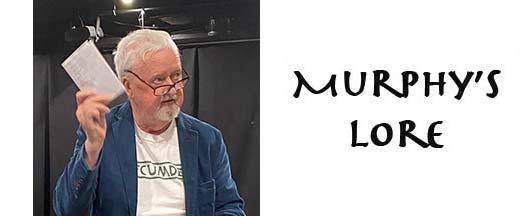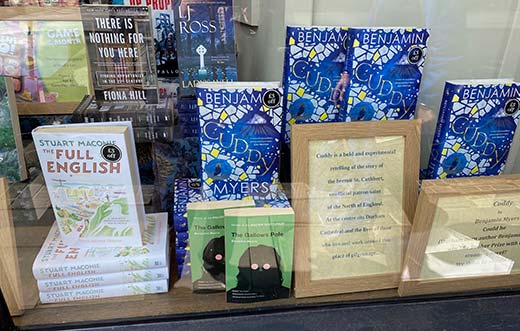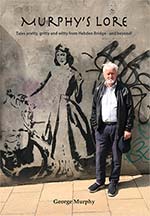
Third series, episode 33
All 125 episodes are available here on the HebWeb.
In episode 33 of series 3, there's a Meadows and a Myers, theres a Saint, a Blossom Tour, a Cathedral, and other views to behold, a novel to be sold, terrible injustices and one close to home, and the mystery of Mr E.

The Gallows Pole
After the screening I dashed down some notes:
It says so much, that the voices of ordinary working people have rarely been heard in TV costume dramas.
The ensemble playing was superb, alive and true.
Loved the `pause - y' chat between David and Grace, whether improvised or Shane written, it was funny and brilliantly revealing.
Visually strong –
This history is a narrative we all should know.'
Waiting to be broadcast
In 1980, our posh London offcumden friend Sally, who'd got a job in broadcasting from another posh friend, as the price for giving her advice on early learning, invited me to send in a script based on the history of the Cragg Vale Coiners. Stan Barstow commended my draft, but warned me to tone down the dialect, "As I've found out to my cost!" Stan's novels were being rejected. The north was no longer in vogue.
At YTV Studios, the commissioning editor Michael Scarborough surprised me by asking if I was interested in writing for soaps and, although I was miserable in my day job, I wanted the Coiners tale told and so I looked a gift horse in the mouth, slammed the door in my own face, cut my throat and spontaneously told the truth.
"I can't stand soaps."
Michael was surprised but recovered, and advised me to try writing poetry. Perhaps he knew YTV already had a draft series under consideration – a pitch from an in house producer, who lived in Heptonstall as I later discovered.
But in any case the series never screened. It would take another forty years and the endeavours of an award winning novelist to gain national recognition for a forgotten but important part of our history.
Early to rise
In The Times an article advised:
Wake up to better sex, set the alarm for 7.30!
On the letters page next day, a reader responded with a ditty his father liked to share. Which I promptly posted. H the Poet sent word that she remembers her brother belting out his own version, to the tune of Hark the Herald Angels Sing.
Uncle Fred and Auntie Mabel,
Fainted at the breakfast table.
This should be sufficient warning
Never do it in the morning.
Wrongly Accused
Five notorious miscarriages of justice were presented by investigative reporter Louise Shorter. In the final programme, it was moving to hear her tribute to Campbell Malone, the crusading Todmorden solicitor in the case of Stefan Kiszko's false imprisonment for the murder of 11 year old Lesley Molseed, a pupil at a special school in Rochdale. The police investigation and the defence case presented by David Waddington QC were shown to be flawed, but his remarkable mother Charlotte always stood by Stefan. `When you are 100 per cent sure your son is innocent, you fight to the very end.'
Stefan developed schizophrenia during his sixteen years imprisonment, and only lived for 22 months following his release. His mother died four months later. Lesley's murderer, Rochdale taxi driver Ronald Castree, was eventually convicted. Forensic evidence had been taken at the time of the murder, which 30 years later, thanks to advances in DNA techniques, led to Castree's conviction.
Another case looked back to 1950 and the infamous miscarriage that led to Timothy Evans being hanged for the murder of his wife and baby daughter. The chief prosecution witness was Evans's landlord John Christie, who was the real killer. Timothy's 94 year old sister relived the events leading up to her brother's conviction and hanging, and the terrible burden she had borne over the last 70 years of the state executing her brother.
The phantom cheat
From Bing, I received an example of an Ai condolence letter, for use after a dear friend's `passing,' ending, 'Yours Sincerely.'
Which made me laugh. But in universities you can bet boffins are scratching their hardboiled eggheads about how to assess written coursework. As a lecturer, I was used to detecting plagiarism, but Ai might become the uncatchable cheat. Perhaps extra marks will be given to students who make occasional howlers, suggesting their work is not really computer generated. But then, in time, shrewd algorithms will learn the trick of making minor gaffes. Then to err might not be human after all.
May Blossom tour
In gleaming sunshine, we drove north through the limestone villages beyond Bolton Abbey, stopping for scones at Burnsall and slowing to 20 mph through Starbotton, not to disturb Mr Priestley. Creamy may flowers smothered the hawthorns in the fields and hedgerows. We zigged and zagged up limestone pavements, noting defunct pillboxes along the way and passing high altitude carparks where drivers had paused to admire the wide spread of God's zone county below, as I churned the gears to negotiate sharp bends, power up steep climbs and inch past nonchalant chewing the cud sheep. In a wide valley that looked like white confetti had been thrown over it, we passed West Burton, where in the eighties Tito's wartime surgeon Mr Wooller allowed us and our friends to camp in his grounds, enjoying the annual gatherings of expat peoples celebrating the different cultures and varied cuisines of Yugoslavia. But where the PG Serbian language guy amongst us quietly told me, "Given half a chance these lot would be at each other's throats."
In the northern dales, cow parsley and wild garlic put on a show beneath cloud coloured drystone walls and shaved and shaggy hedgerows. There wasn't as much roadkill this year, which counter intuitively told a sad story. The lanes were often patterned by shade from ash and beech, just coming into leaf. Nearing Richmond, old gold gorse peppered the fringes of army firing ranges.
Our stop was at the Rose and Crown in Romaldkirk, where in the little church, a medieval tomb is topped by a sculpture of a fallen soldier that might long after have inspired the young Henry Moore. As we stepped out of the car a bird of prey swooped down and lifted a flailing fledgling from the gravel and flew off with its prey unnoticed by the hearty foursome enjoying alfresco drinks and singing a rousing folk song like extras from a travelog.
The pub grub scored four stars on the PW scoring system, unrivalled in those parts except for the Star Inn at Harome, which is slowly recovering from the recent arson attack on its four foot thick fourteenth century thatched roof.
A bit of Reiver crack
 In Durham we caught up with Carol, one of PW's beloved cousins, and her chap Alan. For forty years Alan built fibreglass Reiver boats and launched them onto the River Wear. He was also a water skier. On a hot day at Kielder he once skied on a pond in his bathers, but discovered that wetsuits should be worn on all water skiing occasions, as the water pressure had a `colonic irrigation' effect. The consequence was a fouling of waters where even the privatised water companies had failed to spread their muck. Meanwhile, the bikini clad lasses, presumably deviating from Alan's course, and avoiding his man spanning posture, found that their laps round the pond afforded far more pleasurable, but front body sensations.
In Durham we caught up with Carol, one of PW's beloved cousins, and her chap Alan. For forty years Alan built fibreglass Reiver boats and launched them onto the River Wear. He was also a water skier. On a hot day at Kielder he once skied on a pond in his bathers, but discovered that wetsuits should be worn on all water skiing occasions, as the water pressure had a `colonic irrigation' effect. The consequence was a fouling of waters where even the privatised water companies had failed to spread their muck. Meanwhile, the bikini clad lasses, presumably deviating from Alan's course, and avoiding his man spanning posture, found that their laps round the pond afforded far more pleasurable, but front body sensations.
There's a musical enjoyment in listening to folks having dare I say, `a bit of a crack', which I enjoyed again when watching Gallows Pole part one a week later.
Cuddy

In Waterstones, Cuddy (Bloomsbury, 2023) was in the window display, with loyal post it notes plugging Benjamin Myers, Durham city born and bred, to win this year's Booker prize. After reading it, I'd already taken soundings. A storyteller told me she thought it was a return to form, not having enjoyed the recent 'short stories about men.' Others have merely browsed through it in shops and been put off by the extended, poetic, 'Kathy Acker' opening. Back home, a dapper poet greeted me in the park gardens and championed the novel as a 'Literary Work'.
Book 1 - Saint Cuddy features the slow mapping of a coffin bearing, Viking dodging journey that started at the end of the first millennium. My favourite Books are probably the comical tales, especially, the darkly comic ones. And in Daft Lad, 2019, I recognised the kindly workers in the Cathedral, having been shown around after hours on one occasion by guides doing overtime to help me find the Holbein biography that PW had left in my safe-keeping. Eventually we tracked it down, the kitchen staff having saved it for me behind a counter after I'd earlier enjoyed their coffee and carrot cake.
I perhaps ploddingly wish a photograph of the Cathedral was on the front cover of Cuddy. For its soaring magnificence can still startle visitors. Jonathan Meades admitted in a laudatory chapter in Museum without Walls (Unbound, 2012), he had never previously been to see it before travelling north for a conference at the University. I hope he travelled there by train, which is how I first saw it, fifty years ago, in pursuit of a miner's daughter.
Inside the cover of Cuddy, you might discover a Book in which satire is turned on its post Darwinian head, and wonder if the writer was on the same side as the eponymous saint and shares his faith in his risen Lord. But that would be prying. And with fiction, who needs to know?

Ruskin's View
 On the return leg of our short break we hit the high road over the Pennines from Bowes towards Penrith, avoiding the rough moorland that Auden found moreish, and only turning south when Brough and its castle came into view. Then we trundled sedately along the traffic free roads through Kirkby Stephen, past sleek, bluebell clad hills alongside the Settle Carlisle line, before snaking through Sedbergh and on to Kirkby Lonsdale, for its Devil's Bridge, cluster of shops and eateries and a chic waitress service café at the end of a snicket. If you visit, walk on to the church and through the graveyard to Ruskin's View, which will fall into the river soon if visitors and amateur camera snappers don't stump up a million pounds between them. Thinking of which, here's a snap my border reiver Mrs took in pre Covid times.
On the return leg of our short break we hit the high road over the Pennines from Bowes towards Penrith, avoiding the rough moorland that Auden found moreish, and only turning south when Brough and its castle came into view. Then we trundled sedately along the traffic free roads through Kirkby Stephen, past sleek, bluebell clad hills alongside the Settle Carlisle line, before snaking through Sedbergh and on to Kirkby Lonsdale, for its Devil's Bridge, cluster of shops and eateries and a chic waitress service café at the end of a snicket. If you visit, walk on to the church and through the graveyard to Ruskin's View, which will fall into the river soon if visitors and amateur camera snappers don't stump up a million pounds between them. Thinking of which, here's a snap my border reiver Mrs took in pre Covid times.
The Mystery of Mr E
I brought home two trophies from our visit to Waterstones in Durham. One was Dance of the Photons, by the 2022 Nobel Physics prize winner, Anton Zeilinger, subtitled Einstein, Entanglement, and Quantum Teleportation. I was partly lured by the photograph of the young man on the cover. Rumour had it he once had a mini break in Hebden Bridge.
Mr E!
Said our Tourism Chief of renown,
When visitor numbers wor down,
Albert Einstein once stayed in this town.
He didn't!
He did.
He didn't!
He did. He wor at Grand View, B&B.
He worn't!
He wor.
He worn't!
He wor. And t' locals called him, Mr E!
But mainly he used his vacation,
To think on his Special Equation.
What else did he do in these parts?
Well, he wor a bit of a dab hand at darts.
He worn't!
He wor.
He worn't!
He wor. He scored a nine dart finish from t' ochie.
He didn't!
He did.
He didn't!
He did. For t' Railway against Horse an' Jockey.
But mainly he used his vacation,
To work on his special equation.
Mind, I only wish I'd had a ticket,
To watch Mr E playing cricket.
He didn't!
He did.
He didn't!
He did. He wor a spin bowling sensation.
He worn't!
He wor.
He worn't!
He wor …
Bamboozled batsmen wi' his oscillations.
And he went on long peregrinations,
To off beaten track destinations,
Just to work on his Special Equation.
Mind, he took in a Music Hall Show,
Emceed by a comedy duo.
And t' Straight Man – being mor sage –
Got Mr E up on stage.
He admitted on sporting occasions,
He made use of simple equations,
But all this wor just a rehearsal,
For stating a Law Universal!
T' Comic MC said, `By he's clever!
He's got twice our brains put together!
"BUT THAT'S IT!" Mr E declared …
And he points to himself …
Then to t' joint MCs …
He didn't!
He did.
He didn't!
He did.
He said, "E EQUALS MC SQUARED!"
Murphy's Lore, the book, is available to order here
If you would like to send a message about this piece or suggest ideas, email George Murphy
More Murphy's Lore
See the Murphy's Lore home page for all 125 episodes.


